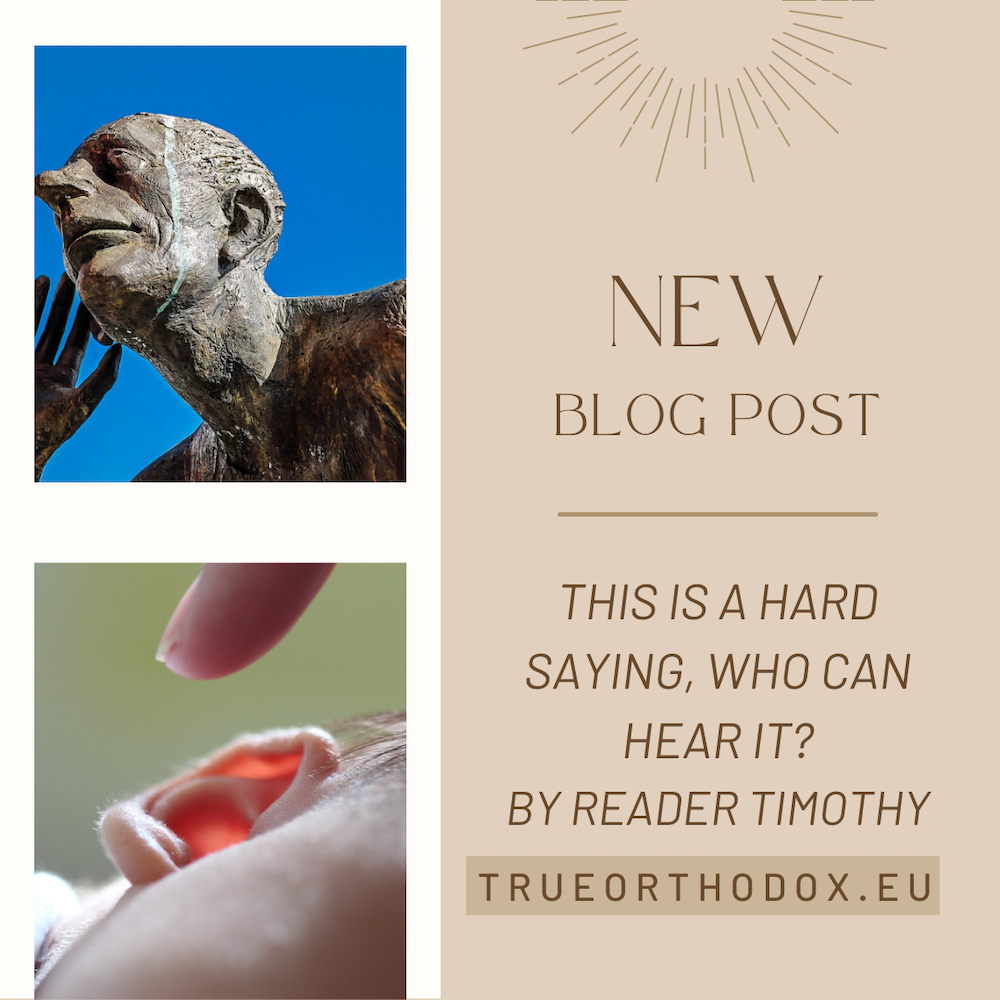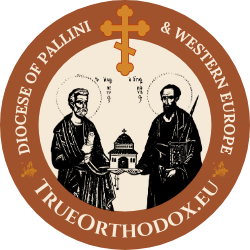This is a hard saying, who can hear it?

by Reader Timothy
In the name of the Father and of the Son and of the Holy Spirit. Amen.
“This is a hard saying, who can hear it?” – John 6:60
“He who reads the books of a heretic immediately communes with an evil, dark spirit of falsehood.” – St Ignatius Brianchaninov – The Field (From Chapter 4 On Avoiding Those Books That Contain False Teaching)
I am a sinful creature. The Lord’s clear teaching is that His ‘yoke is easy’ (Matthew 11:30). However, the enemy of mankind has tricks aplenty to entice me to throw off the ‘light burden’ of the Lord and refuse His commandments in favour of some apparent worldly delight and the heavy chains of sin.
Perhaps one of the devil’s more subtle tricks is to convince us that we are taking the narrow path, the hard road, and that our sin is in fact for the benefit of others and not actually just for the satisfaction of our carnal nature. I tend to associate ‘carnality’ with lusts of the flesh, of the bodily passions, but the mind too is earthly, and there is a carnal pleasure to be found in worldly thoughts or writings. Even things that are not obviously ‘pleasant’ can still be pleasurable to me, after a fashion, if they reinforce my own carnal interpretations of things.
Therefore St Ignatius Brianchaninov exhorts us:
“…whoever wants to acquire heavenly wisdom must first leave behind his own earthly wisdom, no matter how great it is, and to recognize its true nature – it is an attack on God.” – St Ignatius Brianchaninov – The Field (From Chapter 4 On Avoiding Those Books That Contain False Teaching)
“Because the carnal mind is enmity against God: for it is not subject to the law of God, neither indeed can be.” – Romans 8:7
The lexicon of the Church in the next few days is apt. It seems to me that we must recognise the total sovereignty of the Lord our God in all things, even and especially in these times of ‘miraculous’ quantities of worldly information, of words and news and analysis, flowing like an everlasting stream from each and every glowing screen, of which there is also an unspeakable abundance.
We must remember, that although the Fathers did not explicitly speak of, let us say, Youtube or Facebook, the fact remains that a computer or smartphone is a device that reads written code. It can then interpret that code and turn it into video, audio, online prints or posts that are viewed in a manner unlike reading books, but all media undoubtedly fall under the classification of ‘writings’.
“This is a hard saying, who can hear it?” – John 6:60
Who indeed? The implication for us as modern True Orthodox Christians may seem dire depending on your point of view, but we ignore the commandments of the Lord at our peril.
In the Gospel of John, following the miracle of the feeding of the five thousand, wrought for the sake of mercy rather than for show or proof, the Lord is charged with giving another sign for the purposes of convincing everyone beyond a shadow of a doubt, perhaps like giving them some manna from heaven like Moses had done. He refuses, and through them chides our fallen nature that only seeks to follow God when He offers us bewildering abundance, but will not believe when something is asked of us. Here the Lord continues to gradually introduce us to the vitality and the universality of His teaching, and further, to the central mystery that we celebrate to this day – the Holy Eucharist. The cornerstone and the stumbling block both.
“I am the bread of life.” – John 6:48
“I am the living bread which came down from heaven. If any man eat of this bread, he shall live forever: and the bread that I will give is my flesh, which I will give for the life of the world.” – John 6:51
Of course, we know that this refers to the Eucharist, but that is the central celebration, the ceremonial apotheosis of this wondrous and miraculous teaching and not the point I would like to write solely about today. I think we all know that we miss the point if we think that our only responsibility as True Orthodox Christians is to attend regular Liturgies. Our pastors will tell us that our participation in the Liturgy, as well as being dependant on our purification through fasting and the mysteries of confession and absolution, is also dependant on our personal faith, and on the contents of our hearts.
Therefore our whole lives must be offered to God. We already know this. We must observe the fasts, we must pray, we must give alms according to our means, we must examine our consciences, we must study the Gospel, the works of the Fathers and the Lives of the Saints. More than this, we must refrain from meats offered to idols (Acts 15:29) and we must not read the works of heretics. To do so is sin, plain and simple. There is but one exception:
“Spirit-bearing Holy Fathers and teachers of the Church read the writings of blasphemous heretics only because they were forced to do so by the needs of the entire Christian world. With their powerful, spirit-filled word, they denounced the delusions of heresies that masqueraded as holy and pious teaching and revealed their hidden danger to all the children of the Church.” – St Ignatius Brianchaninov – The Field (From Chapter 4 On Avoiding Those Books That Contain False Teaching)
“For the wages of sin is death, but the gift of God is eternal life in Christ Jesus our Lord.” – Romans 6:23
“For the letter kills; but the spirit gives life” – 2 Corinthians 3:6
“The words that I speak to you are spirit and they are life.” – John 6:63
“In the beginning was the word.” – John 1:1
“The word was made flesh” – John 1:14
“He that eateth my flesh and drinketh my blood, dwelleth in me and I in him.” – John 7:56
So, when St Ignatius Brianchaninov tells us, “Keep your mind and heart from false teaching. Do not even speak about Christianity with people who have been infected with false thoughts; do not read books on Christianity that were written by heretics. The Holy Spirit accompanies all Truth. He is the Spirit of Truth. The devil accompanies and acts together with every lie. He is false, and the father of lies.”, we absolutely must realise that this teaching is more vital to us today than it has ever been, and it concerns ‘information’. There are ‘dead letters’ and there is the living Word of God. Just as a little poison mixed with food makes the whole dish poisonous, just a little heresy does the same.
“This is a hard saying, who can hear it?” – John 6:60
The plain truth is that all these blogs and podcasts and lectures and commentaries and debates and news reports that occur online are almost exclusively the works of heretics. Even if they are not Christian heretics in the strictest sense, if they are simply worldly intellectuals and authorities of some stripe, then the same things applies – they simply cannot be completely true because ‘The Holy Spirit accompanies all Truth”. Without judging them or condemning them, we can say for absolute certain that their ideas and their words are ‘things offered to idols’, to the idols of their intellects and theories. These are the things with which these public academics make their money, and we know that you cannot serve God and Mammon (Matthew 6.24) These influencers, regardless of how well-regarded, alternative, high-brow, low-brow or whatever these people might be to us, are the Demetriuses of today (Acts 19), crafting their delicate and appealing ideologies for us to buy and invoke at our leisure, to adorn our own blasphemous and idolatrous gardens of personal philosophy.
Of course, it is for each of us to speak to our spiritual fathers about our own ‘intake’ of popular culture and our engagement with the world in general, but it is clear that increasingly the boundaries have been blurred – the idea that there is such a thing as ‘secular’ writing or study is, broadly speaking, an idea of the Western heretics anyway. Perhaps we are not going to be in too much trouble for watching a cookery programme (although naturally this kind of thing should be avoided during fasts), for example, but it is for ourselves and God to know the contents of our hearts, and we are going to have to answer for these things, one way or another.
It is also worthy of note that, particularly, in the modern era, since the ascension of communism as a political force in the world, but arguably since well before then (the founding of the Church of England in the Commonwealth, and the founding of the Papacy in 1054, the rise of Islam), religion and politics are completely intertwined. Communism is a deliberately atheistic, and thus religious, philosophy in the sense that it is a ‘belief system’. Same goes for ‘secularism’ and ‘humanism’.
To reiterate one last time:
“Only those religious books that are written by the Holy Fathers of the universal Orthodox Church are acceptable to read. The Orthodox Church requires this of her children.
“If you think otherwise, or find this command of the Church less authoritative than your own opinions or the opinions of others who agree with you, then you are no longer a child of the Church, but a critic of the Church.” – St Ignatius Brianchaninov – The Field (From Chapter 4 On Avoiding Those Books That Contain False Teaching)
As I have said above, it is not a huge leap by any means to say that writings about politics, current geo-politics and so on, given that these machinations are all between non-Christian ideological systems, still qualify as having religious content, so that even though St Brianchaninov does suggest that it is principally ‘religious’ works and conversations with heretics that should be avoided, it is clear that there is little in today’s completely apostatic world that does not have religious implications. This is True Orthodoxy, and perhaps why Our Lord asks that terrible question in Luke 18:8?
Christ offers Himself to us in the Bread of Holy Communion and in the Spirit of His Word. These things are not distinct, but part of the Spirit of God that is administered to us through His Holy Gospel, His Holy Church and Her representatives, the Holy Fathers, and our pastors. These are the only things that can redeem our fallen nature and make us to be a ‘house of the Divine Spirit.’. Glory to God for all things.
Today is celebrated the memory of St Zaccheus the Publican, later Bishop of Caesarea. Let all those of us who are small in spiritual stature climb up on the writings of the Holy Fathers and not on the rotten branches of the trees that ‘bring not forth good fruit’ (Matthew 3:10), so that the Lord might one day say to us “come down for I must stay at your house today.” (Luke 19:5).
Christ is risen from the dead, trampling down death by death, and on those in the tombs bestowing life.
O Lord Jesus Christ, Son of God, for the sake of the prayers of Thy most pure Mother, our Holy and God-bearing fathers, and all the saints, have mercy on us. Amen.






